Judas Priest
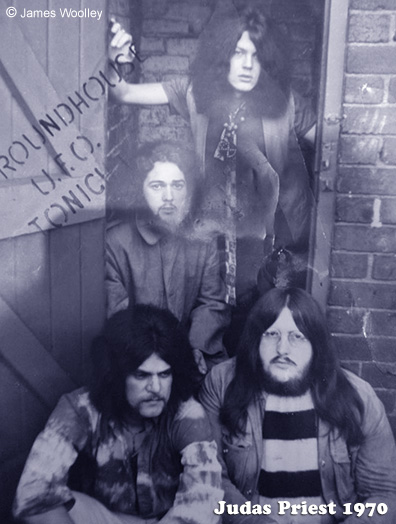
BIRMINGHAM
Updated September 2022
First line-up 1969/70
Alan "Al" Atkins lead vocal
Brian "Bruno" Stappenhill bass guitar
John Partridge drums (left 1970)
Ernest "Ernie" Chattaway guitar
Fred Woolley drums (joined 1970)
Second line-up 1970/75
Alan "Al" Atkins lead vocal (left 1973)
Kenneth "KK" Downing guitar
John Ellis drums (left 1971)
Ian Hill bass guitar
Alan Moore drums (joined 1971, left 1972, re-joined 1975)
Chris "Congo" Campbell drums (joined 1972, left 1973)
Rob Halford lead vocal, harmonica (joined 1973)
John Hinch drums (joined 1973, left 1975)
Glenn Tipton guitar, keyboards, vocal (joined 1974)
"Living After Midnight"
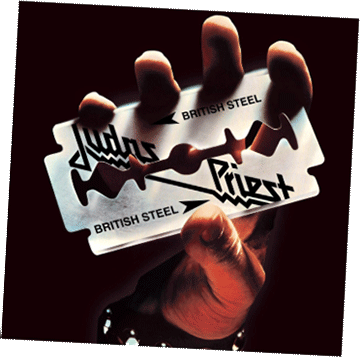
This world-famous band's origins can be traced back to the West Midlands music scene of the mid-1960s. While Birmingham's own Black Sabbath is usually credited for inventing the style of music known as "Heavy Metal", Judas Priest gave this heavy sound a mass popularity as demonstrated by making many million selling records and gaining legions of fans!
The group members all came from the West Midlands industrial area known locally as "The Black Country" due to a long history of coal mining with its many fiery furnaces and foundries to make and forge iron and steel. The band underwent a lot of line-up changes before reaching their formidable level of worldwide success.
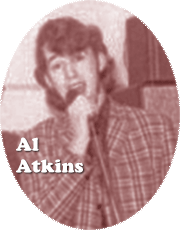
Powerful vocalist and founding member Alan "Al" Atkins was born October 14, 1947 and grew up in West Bromwich where he formed his first band with school friends as early as 1963. Al was playing drums at the time and inspired by pop groups such as The Beatles and Rolling Stones. Maybe it was no coincidence he chose the loudest instrument to play in a band before the days of big guitar amplifiers and powerful public address systems!
Like most young groups, Al's first band didn't last long but he persevered and met up with local guitarists Brian "Bruno" Stappenhill and Albert Hinton with whom he formed a trio called "The Reaction". Al became the drummer and vocalist for the band. The Reaction attracted the attention of manager Ken Ford after they'd performed in a few small pubs and clubs.
Another guitarist Brian Fieldhouse was recruited to fill out the sound and it was his suggestion they change the name of the band to "The Bitta Sweet". Al Atkins also decided to give up the drums and come out front as their main vocalist. He was replaced on drums by Lawrence "Lossa" Farley. Al recalled; "We were gigging quite a lot by now and I was finding it difficult singing and playing drums. Everyone said I was a better vocalist than a drummer so I switched to being a front man."
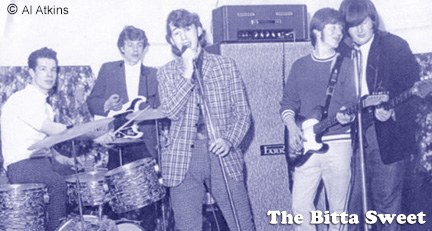
Brian Pourney was their bass guitarist at the time but when he left, Bruno Stappenhill took his place after purchasing a Futurama six-string bass. The Futurama got broken when their roadie stepped on it so Bruno replaced it with a second-hand Fender Precision.
The Bitta Sweet must have been good for by 1966, manager Ken Ford booked the band to play larger local venues such as 'The Adelphi' and 'Gala' halls in West Bromwich and 'Old Hill Plaza' and 'The Rialto' in Birmingham. Performing many hits of the day, they were soon opening for well-known names like "Dave Dee, Dozy, Beaky, Mick and Titch" along with Cat Stevens, Long John Baldry, Davy Jones and The Lower Third (who went on to become David Bowie), and "Steampacket" whose vocalist was a young Rod Stewart.
The Bitta Sweet projected a Mod-style image on stage and were likely quite loud for the time as evidenced by a large "Park" amplifier in the only known photo shown here of their line-up. One of their local rivals was a group called "The Band of Joy" who were fronted by a then almost-unknown Robert Plant - previously vocalist for a popular Walsall group called The Listen. The Bitta Sweet and the Band of Joy would sometimes be featured on the same bill.
"this band was the first big stepping stone in my career"
During 1967 despite the growing number of bookings for The Bitta Sweet, or maybe because of it, some of the band members became less committed than others and eventually decided to call it a day and "get a real job". Al Atkins said; "We never secured a record deal and we split up when Albert got married and moved to Australia. But this band was the first big stepping stone in my career."
Al's next group was another local line-up called "The Sugar Stack". They were formed by guitarists Geoff Furnival, Mick Reeves and drummer John "Fezza" Partridge. Al Atkins recalled; "Bruno and myself were asked to join them on bass and vocals when they heard The Bitta Sweet were splitting up. When we saw the class of the players they were, we instantly did."
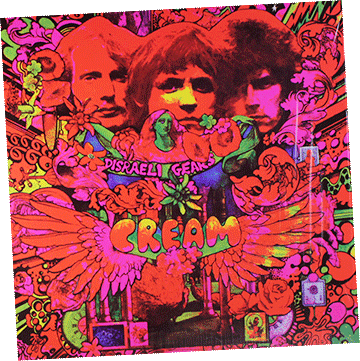
Sugar Stack were getting regular work playing their own brand of pop, blues, and Tamla Motown so were kept busy after Al and Bruno joined them. Although this band had some good times together, Al, Bruno and John began to tire of the group's pop side and wanted to play heavier music with Eric Clapton's "Cream" being a major influence at the time.
The Sugar Stack split within a year but on a sad note, guitarist Mick Reeves who eventually went on to success in a hard-working group called "The Possessed" was tragically killed in 1976 along with other young band members in a road accident following a gig up north. He was only 24 years old. Also in that group was Band of Joy founding member Vernon Pereira who died in the crash.
Al Atkins and Bruno Stappenhill along with guitarist Dave Goodman formed a new group in 1968 called "Blue Condition" named after a song on Cream's "Disraeli Gears" album. They wanted to play a style of heavy progressive music with of course the volume knobs turned up high. Darlaston drummer Pete Boot was "enlisted" into the line-up.
"I accepted the offer as Bruno threatened to sit on me if I refused!"
Pete used to practice his drums in a room above his parent's shop called The Spot Cafe. He recalled; "One night there was a knock on the door and I thought that someone must be complaining about the noise I was making. I was confronted by a huge figure of a man (Bruno Stappenhill) flanked by two others - Al Atkins and Dave Goodman. They wanted to start a new band. I obviously accepted the offer as Bruno threatened to sit on me if I refused!"
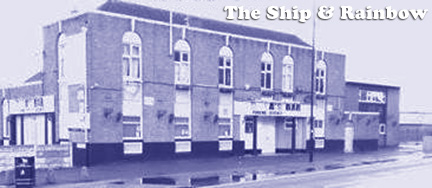
Blue Condition rehearsed and performed locally for about six months wherever they could find a gig. One of their regular venues was "The Ship and Rainbow" pub in Wolverhampton. The band went down to Romford in Essex where they were auditioned by Ron King Management who managed the hit pop group Amen Corner. Though they played a good performance, Blue Condition failed the audition with Ron telling them in his heavy cockney accent "Ya too fuckin progressive".
Following disagreements, Al Atkins left the Blue Condition line-up and took Bruno with him. Pete Boot went on to join another group called "The Extreme" but he would one day play with Al and Bruno again in a hard rock lineup called "Lion".
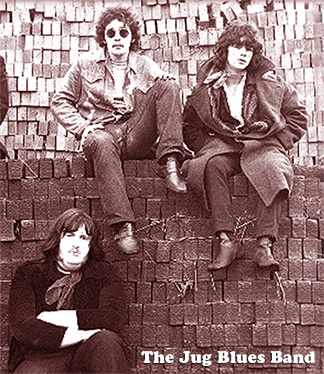
The next band for Al Atkins and Bruno Stappenhill was called "Half Breed". This was later changed to "Chapters of Life" until their agency decided the name was too progressive so they became "The Jug Blues Band". This five-piece lineup also included guitarists Barry Civil and John Perry along with his brother Jim Perry on drums.
"The Jug" lasted for about a year. Al Atkins said; "This was another good band but I was always working for something better. One night while playing at The Civic Hall in Wolverhampton with Spooky Tooth and Slade, a well known local guitarist named Adrian Ingram asked me to join up with him and his band called Evolution and go on tour".
Al Atkins accepted Adrian's invitation and announced to his bandmates that he was leaving. It didn't go down well with them but Al left anyway to join "The Evolution". Within a week, Al found out the "tour" would be three months in Morocco and he was also expected to drive the tour bus!
He recalled; "I told them to 'stick it where it hurts' and went back to try to reform Jug the next week. As it happens they also told me to stick it as well - so is rock 'n' roll you know." The trouble was, Al's bandmates were none too happy to see him return after leaving them in the lurch so for the first time he found himself without a band or a gig.
"We started rehearsing and writing some of our own songs, classing ourselves as a progressive rock band"
"It was the summer of sixty nine..." and as real friends go, it wasn't long before Bruno Stappenhill rejoined Al Atkins to form yet another new group. They enlisted drummer John Partridge from their old band Sugar Stack along with guitarist John Perry from the Jug Blues Band. Rehearsals went well until tragedy struck when John was killed in a car accident. Following the funeral, they auditioned for a replacement guitarist.
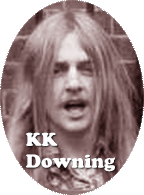
Heavy metal guitar master Kenneth "K.K." Downing was born on October 27, 1951 in West Bromwich. His first guitar was an old acoustic that he bought for ten pounds. A year later he'd saved enough to buy an electric one. He left school and home at age 15 to try and make a living as a musician. Jimi Hendrix was a big early influence along with Eric Clapton. Kenny's first band was called "Stagecoach" who performed mainly blues and "Cream" covers. He also worked as a trainee chef at a pub in Hagley.
Al Atkins and Bruno Stappenhill weren't too impressed with KK Downing's guitar playing ability when he turned up for the audition. They instead chose seventeen year old Ernest Chattaway who Al thought looked a lot like Marc Bolan. Al said; "KK lacked the experience at the time to come up to scratch. Ernie was a natural musician who could play guitar, keyboards, harmonica, and who hailed from Birmingham."
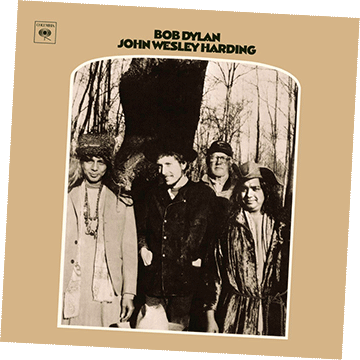
The Brum group "Earth" had recently changed their name to the more controversial "Black Sabbath". Al liked the sound of it so they decided to look for something similar for their own line-up. Bruno Stappenhill came up with "Judas Priest" after a Bob Dylan song titled 'The Ballad Of Frankie Lee And Judas Priest' from his influential "John Wesley Harding" album.
Alan Atkins recalled; "We started rehearsing and writing some of our own songs, classing ourselves as a progressive rock band. We also played covers of bands like Spirit and Quick Silver Messenger Service." Finding gigs for Judas Priest became a problem though. They even tried advertising themselves in a local newspaper.
Things started to look up when Alan Eade who worked for a company called "Ace Management" showed interest in the group. He arranged a few gigs for the band and some studio time to record some demos. Judas Priest recorded two Al Atkins originals titled 'Good Time Woman' and 'We'll Stay Together' that were sent off to a number of record companies.
Al said; "We had interest from the 'Harvest' and 'Immediate' record companies so we did a live showcase for them at a local venue in Walsall, The George Hotel. Immediate Records liked the sound of us and gave us a deal. We signed a three year contract and starting putting songs together for the first album".

The Immediate label was founded by former Rolling Stones manager Andrew Loog Oldham and was famous for having groups such as "The Small Faces", "Fleetwood Mac", and "Humble Pie" but had experienced financial difficulties for some time. Two months after signing their contract, Judas Priest received bad news from their manager Alan Eade that Immediate Records had gone out of business and so their plans for recording an album came to nothing.
"I wanted to explore the rock side and break away from the bluesy feel the band had developed"
The group decided to carry on with gigs and touring for the remainder of 1970 along with their "roadie" John Ward. However, within a few months, drummer John Partridge left to go and live in Stourbridge. He was replaced by Fred Woolley from Birmingham who successfully passed the audition and who is shown bottom left in this rare photo of the early Judas Priest line-up sent by his son James.

Al Atkins remembered; "We started to drift apart musically. I wanted to explore the rock side and break away from the bluesy feel the band had developed. So, midway through 1970, we decided to split and go our separate ways."
Thus ended the original version of Judas Priest within a year of the group's formation. Co-founder Bruno Stappenhill joined a line-up called "The Roy Gee Explosion" with whom he went over to Denmark. Ernie Chattaway moved to London and Fred Woolley eventually met up with both of them to form another group called "Bullion". Meanwhile, Al Atkins "got married and settled down for a while to gain a little sanity."
By the end of 1970, Al Atkins grew restless and went in search of a new group to perform with. While checking out a popular local rehearsal spot in Wednesbury known as "Holy Joe's" located in St. James Church school basement, he heard the sound of loud electric guitars. A look round the door revealed three long-haired lads blasting away with the amps turned up full.
Al Atkins said; "One guy was KK Downing who I'd auditioned a year earlier. The other two were Ian Hill on bass and John Ellis on drums Also present was their friend and roadie Trevor Lunn. I asked them if they needed a vocalist, and they said yes."
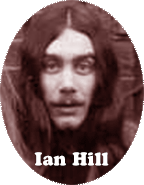
Ian Frank Hill was born on January 20, 1951 and grew up on the Yew Tree Estate in West Bromwich. A lifelong "Albion" supporter, he learned to play double-bass while a teenager as taught by his musician father who played bass in local jazz bands. Ian was only fifteen years old when his beloved dad died but continued to play electric bass guitar with his school friend Kenny Downing who had an electric guitar. They eventually formed a band together playing covers of Cream and Jimi Hendrix.
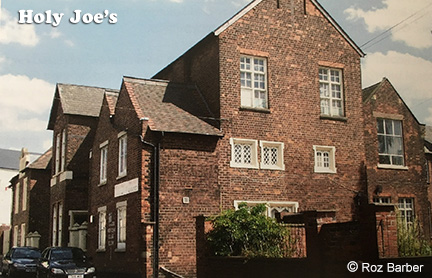
It's worth noting that Holy Joe's in Wednesbury was operated by the reverend Father Husband who rented the practice rooms nightly and collected the cash by calling out "fares please". He would then go off to the pub and return around 10:30 to make everyone leave and lock the place up.
Along with many local bands like Slade, Velvett Fogg, and The Shakedown Sound, Robert Plant's Band of Joy also used to rehearse at Holy Joe's and their roadie Harry Barber recalled; "It was a great place to meet up with other groups, talk about gigs, and what was happening on the music scene."
In this way, guitarist KK Downing, bassist Ian Hill, and drummer John Ellis teamed up with vocalist Al Atkins to form a new group line-up. They started rehearsing together and were going to be called "Freight" but Al suggested they use the name of his former group Judas Priest and they agreed. KK said; "I had this Heavy Metal attitude inside of me. I had it all of my life. When I got into Judas Priest I knew I had a band that had a great name."
"We opened up our set with 'Spanish Castle Magic' by Jimi Hendrix"
The rehearsals went well so after a few months they started gigging. Al Atkins said; "We opened up our set with 'Spanish Castle Magic' by Jimi Hendrix and did covers of bands like Quatermass. One song I remember well was 'Black Sheep Of The Family'. We were also writing some of our own songs and opening for bands like Slade, Budgie, Warhorse, and Gary Moore."
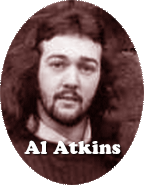
In July of 1971, Judas Priest recorded some demos at Zella Sound studio in Birmingham. Two original Al Atkins compositions were recorded; 'Mind Conception' and 'Holy Is The Man'. By this time they were managed by David Corke who intended to promote the band to the attention of major record companies. John Ellis left Judas Priest and was replaced by drummer Alan Moore. John's last gig with Judas Priest was playing support for Slade at The Yeoman Pub in Derby.
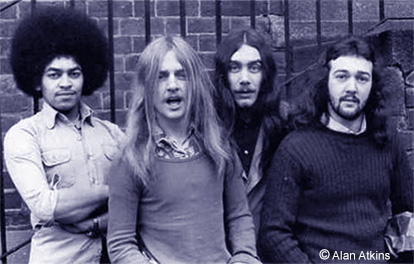
Judas Priest continued to tour all over the UK but it was tough going. "Glam Rock" was becoming the big pop trend at the time but encouraged by the success of other bands like Black Sabbath, they pressed forward.
Alan Moore left the line-up in December to be replaced by Chris "Congo" Campbell from Birmingham in the ever "revolving door" of drummers who performed with Judas Priest. Alan joined the local group "Sundance" but would later return to play on the second Judas Priest album.
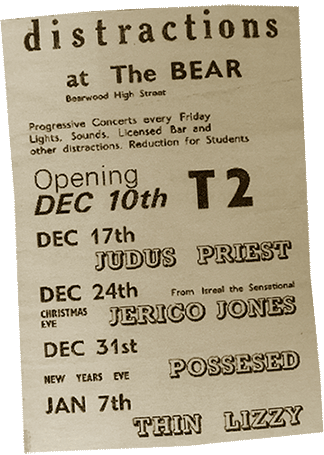
The group wrote many more songs in 1972 including some that would be recorded for the first Judas Priest album. Alan Atkins remembered; "We were now opening for many top bands like Status Quo, UFO, Family and Thin Lizzy while also topping the bill ourselves over up-and-coming bands like Magnum. We were working for an agency and management company, "IMA" from Birmingham, run by Norman Hood and Tony Iommi of Black Sabbath. Our manager David Corke also worked there."
Judas Priest's 1972-1973 hard-hitting setlist included their opener 'Spanish Castle Magic' followed by originals 'Winter', 'Holy Is The Man', and 'Never Satisfied' along with other assorted covers and their big finale 'Caviar And Meths'. The band was well received with ever increasing numbers of bookings, but all the travelling began to take its toll and with rising expenses, there was very little money to go around. They were also still without that elusive record deal.
In May 1973, Al Atkins left Judas Priest, this time for good. He said; "The financial situation became a problem. I had a baby daughter to support so I said goodbye to Priest, got a haircut and took a normal 9 to 5 job. "Congo" also left the band at this time, and our roadie Keith Evans left to join AC/DC as personal roadie and technician to Angus Young. Before leaving I wrote 'Whiskey Woman'. Rob Halford wrote a song called 'Red Light Lady', and the band put the two songs together and titled it 'Victim Of Changes'.
"You could see the molten metal coming out of the vats"
Robert John Arthur Halford was born August 25, 1951 in Sutton Coldfield but grew up in Walsall on an estate near where Noddy Holder of Slade was raised. He started singing at an early age in the school choir but soon became influenced by the great rock 'n' roll vocalists like Little Richard and later Janice Joplin.
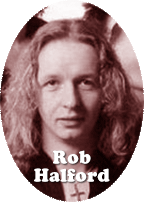
Rob recalled; "On my way to school I would walk past the metal foundries. You could see the molten metal coming out of the vats. I remember sitting at my school desk across from a stamping press factory and you would have these big steam hammers going and the desk would be bouncing a bit."
At age 15, Rob Halford joined his first group called "THARK". His next band was "Abraxis" and this was followed by a line-up called "Lord Lucifer" during which time he bought his first motor bike while earning money as a lighting technician at the Grand Theatre in Wolverhampton. By 1973, Rob was fronting a local group called "Hiroshima" who had drummer John Hinch along with guitarist Paul Watts and Ian Charles on bass.
Hiroshima were doing reasonably well but Judas Priest were regarded as an up-and-coming band. Rob Halford remembered going to a Judas Priest performance at the Birmingham College of Food and was particularly impressed by guitarist KK Downing. Rob was introduced to Judas Priest by his sister Susan who was girlfriend of their bass guitarist Ian Hill.
Rob Halford said; "Sue told me the job was up for grabs and asked if I might be interested. I went over to KK and Ian's place, which was an apartment just outside Birmingham and I sat in the bedroom with them talking about music. Since they were also checking out drummers, I suggested bringing in John Hinch from my previous band Hiroshima. All four of us then went up to Holy Joe's for a rehearsal and everything just seemed to click."
Rob Halford's distinctive and powerful high vocal range would help provide Judas Priest with their classic sound but one important element was still missing. The group embarked on a short tour of Norway and Denmark at the start of 1974 and were signed to a recording contract by the recently formed Gull Records label upon their return.
It was the record company who suggested Judas Priest should add another group member to fill out their sound. In this way, guitarist Glenn Tipton from "The Flying Hat Band" was recruited to the line-up. Glenn could also sing and play keyboards but it was his ability to harmonize in a twin heavy metal guitar attack with KK Downing that would complete the classic Judas Priest sound.
"I'll join Priest for a bit until I can find something else"
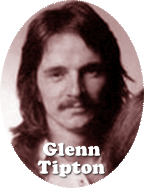
Glenn Raymond Tipton was born into a musical family on October 25, 1947 and lived in the black country village of Blackheath. He had piano lessons at an early age from his mother who was an instructor and remembers learning to play 'Georgia' after seeing The Spencer Davis Group perform at Birmingham Town Hall. Glenn's older brother Gary played guitar in a band called "The Atlantics". Along with his brother and Steve Winwood, Jimi Hendrix became an early influence on Glenn and he also admired Peter Green from Fleetwood Mac which inspired him to take up the electric guitar.
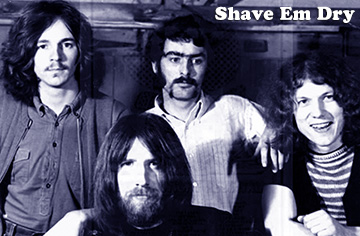
After leaving school, Glenn Tipton was employed at the British Steel works in Halesowen before leaving home and trying to make a living as a musician to the dismay of his parents. Before The Flying Hat Band, he played guitar during the late 1960s in a blues line-up called "Shave Em Dry" that had vocalist Pete Hughes, drummer Barry Scranage, and bass guitarist Dave Shelton. Glenn was a talented guitarist with a classically influenced but bluesy playing style.
The Flying Hat Band were a "power trio" of Glenn Tipton on lead vocals and guitar with drummer Steve Palmer (brother of Carl Palmer) and Peter "Mars" Cowling on bass who went on to play with Canadian rocker Pat Travers. The group supported Deep Purple on a European tour in 1974 and were managed by the previously mentioned IMA company part-owned by Tony Iommi of Black Sabbath. They had a recording contract with Vertigo Records but their planned album was never issued resulting in the group breaking-up.
Glenn said; "We got management problems and Judas Priest asked me to join. I thought I'll join Priest for a bit until I can find something else." While Glenn had intended only to help out recording their first album, he was soon invited into the group full-time by KK Downing who convinced Glenn to join while they were at a pub having a few pints!
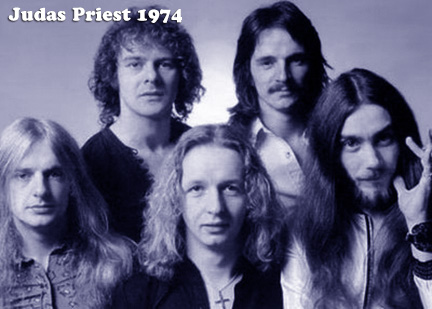
So began the famous core line-up of Judas Priest; K.K. Downing, Ian Hill, Rob Halford, and Glenn Tipton who along with a succession of drummers would go on to conquer the world with million selling records and sold-out stadium shows including the legendary "Live Aid". Not bad for a West Midlands group who were once so hard-up that in Al Atkins words; "We'd go off to a gig and hire a van, pay a couple of roadies, perhaps cover the cost of the P.A., and if we were lucky, we'd have enough for fish and chips and a bottle of pop on the way home."
In the summer of 1974, Judas Priest recorded their first album and single, both titled "Rocka' Rolla" and produced by Roger Bain who had worked with Black Sabbath. The tracks were mostly recorded "live" in the studio as an attempt to capture the group's energy but the record wasn't a big seller. The band went on their first major European tour after recording the album.
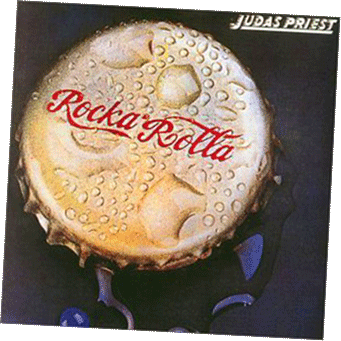
Judas Priest were happy to finally have an album released. Ian Hill fondly recalled with pride seeing their LP in the record shops alongside those of their heroes. However, the band didn't agree with some of the song choices made by the producer and were dismayed to discover their epic 'Caviar And Meths' had been cut down to just two minutes length. In addition, the record company was unwilling to support the band financially so gigs became their almost only source of income with some members having to work part-time day jobs.
A few years later they recorded their second LP for Gull Records issued in 1976 titled "Sad Wings of Destiny" that boosted the group's popularity. For this album, they replaced drummer John Hinch with Alan Moore who had left Judas Priest in 1972. The record was more representative of the group's sound but money was tight resulting in them breaking their contract with Gull who didn't have the resources to properly promote it.
"Metal Gods"
Having proved themselves, Judas Priest signed with a major label CBS who provided a much larger budget to record their third album in 1977 titled "Sin After Sin" produced by Deep Purple's Roger Glover - and with session drummer Simon Phillips. The success of this LP boosted the group's rise to the top but there was still a long road ahead of them before the band gained UK chart success in 1979 with their first hit single prophetically titled 'Take On The World'.
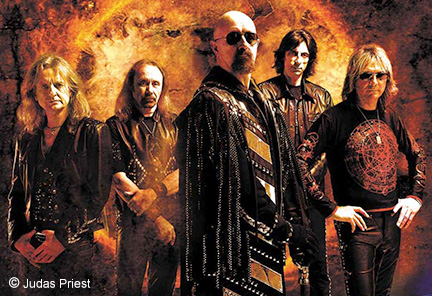
By this time, Judas Priest had perfected their famous "black leather and studs" look on-stage that was imitated by their ever growing number of fans. Classic 1980s albums such as "British Steel" and "Screaming for Vengeance" along with international hit singles 'Living After Midnight', 'Breaking The Law', and 'You've Got Another Thing Comin' propelled the band to superstar status. Dave Holland, formerly of West Midlands groups Finders Keepers and Trapeze was their drummer during that time.
As for original Judas Priest vocalist Al Atkins, he went on during the 1970s to front the hard rock group "Lion" who toured for years all over the UK and opened for many well-known groups including The Sex Pistols! He also recorded well received solo albums and later formed another band called "Holy Rage" with whom he continues to perform and record. Al's latest music venture as producer and vocalist is titled the "Atkins May Project" (see Al's facebook link below).
Bruno Stappenhill, who came up with the original Judas Priest name, continued to play bass guitar in bands "Bullion" and "Lion" (with Al Atkins), and "Warhead" before taking a break from the rock scene. He later joined a pub band called "Wazzocks" before eventually retiring to live in Devon where he still performs today in a working band called "The Cadence".
Amazingly, considering their incredible influence, years in the business, and number of fans along with millions of records sold, Judas Priest have yet to be inducted into the famous "Rock & Roll Hall of Fame".
The complete story of Judas Priest is beyond the scope of this web site and I encourage those interested to read more via the many sources available, but their formation and early years rooted in the West Midlands music scene of the 1960s is a well-deserved inclusion for the BrumBeat web site. I wish them all the best as they celebrate their 50th year in the business of making Metal!
Sources: 'The Guinness Book of British Hit Singles' 5th edition 1985; 'Heavy Duty - Judas Priest official biography' book by Steve Gett published in 1984; 'The Band of Joy' book by Harry Barber published in 2010; 'Judas Priest - British Steel' Classic Albums DVD by Eagle Vision 2001; 'Birmingham Post' Sarah Probert interview with Rob Halford and Ian Hill 2014; plus assistance from Alan Atkins; Pete Boot, Michael Liljhammar, James Woolley, and The Tyrant.
Copyright © John R Woodhouse
Some official Judas Priest related websites are listed below:
The Official Judas Priest Web Site: judaspriest.com
Glenn Tipton: www.glenntipton.com
K.K. Downing: kkdowning.net
Rob Halford facebook page: Rob Halford facebook
Al Atkins facebook page: Al Atkins facebook
If you would like to contribute to this page, please e-mail john@brumbeat.net